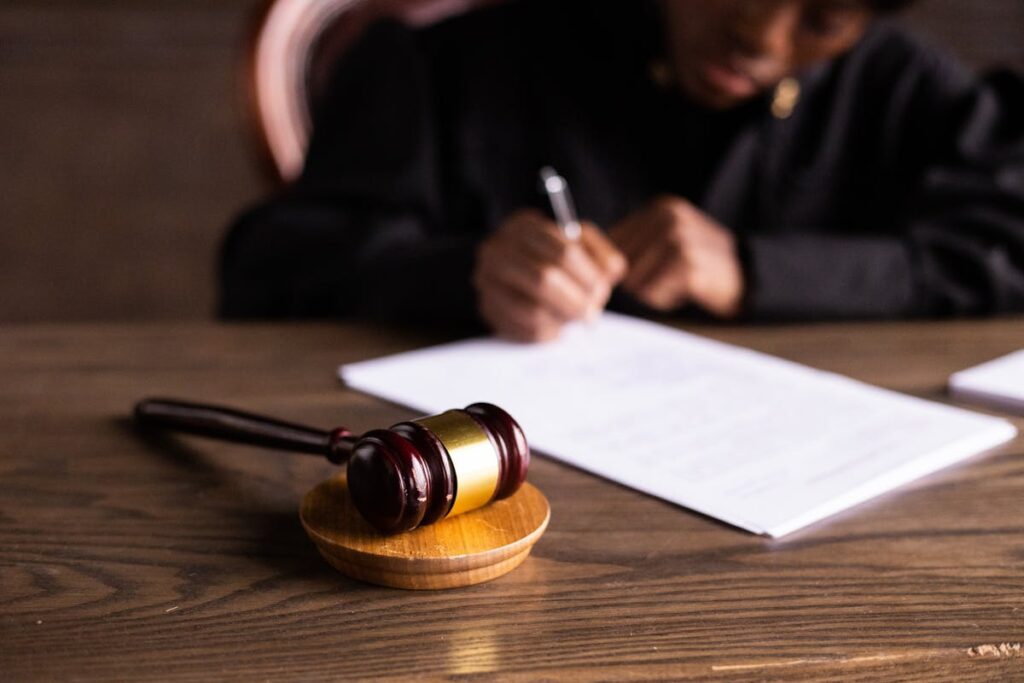Steering through the aftermath of a car accident is fraught with potential pitfalls that can greatly undermine a claimant’s case. Common missteps, such as neglecting to gather evidence at the scene or delaying medical attention, can critically weaken claims. Admitting fault or providing inaccurate information further complicates matters. The intricacies of insurance claims demand careful attention, yet many fall victim to costly errors. Understanding these mistakes is essential for securing rightful compensation. What’s next?
Failing to Gather Evidence at the Scene
One of the most vital errors individuals often make in car accident claims is neglecting to gather sufficient evidence at the scene. This oversight can greatly undermine the strength of their case. Witness statements are essential; obtaining contact information and detailed accounts from those present can corroborate the claimant’s version of events. Equally important is thorough accident documentation. Photographs of the scene, vehicle damage, and road conditions provide visual evidence that can be key in establishing liability. Without these elements, claimants may struggle to prove fault or demonstrate the extent of damages. Consequently, a methodical approach to evidence collection not only fortifies a claim but also positions individuals advantageously during negotiations with insurance companies or in legal proceedings.
Not Seeking Immediate Medical Attention
While gathering evidence at the scene is crucial, prioritizing immediate medical attention is equally important in the aftermath of a car accident. Seeking prompt medical evaluation can prevent a delayed diagnosis, which might exacerbate injury complications. Ignoring symptoms or postponing medical visits often leads to unforeseen health issues, complicating recovery. Furthermore, insurance companies might use the lack of immediate treatment as a reason to downplay the severity of injuries, potentially reducing claim settlements. A thorough medical assessment not only guarantees well-being but also provides essential documentation for legal proceedings. Consequently, immediate medical attention serves a dual purpose: safeguarding health and fortifying the integrity of a car accident claim. This strategic approach helps prevent long-term health and legal challenges.
Admitting Fault or Apologizing
Steering through the aftermath of a car accident requires careful communication, and admitting fault or apologizing at the scene can greatly jeopardize the outcome of a claim. An admission, even if unintended, can have significant consequences. It often leads to complications with insurance companies, who may seize upon such statements to reduce or deny claims. Similarly, an apology, while seemingly benign, can have a profound impact. It may be misconstrued as an acceptance of liability, therefore weakening the claimant’s position. It is vital for individuals involved in accidents to communicate cautiously and avoid making statements that could potentially be used against them. Consulting with an attorney before making any declarations can help navigate this complex landscape effectively, safeguarding one’s legal rights and claim integrity.
Delaying the Filing of Your Claim
Filing a car accident claim promptly is critical to guaranteeing the best possible outcome. Delaying the filing disrupts the claim timeline, potentially jeopardizing the validity of the case. Insurance companies impose strict filing deadlines, and missing them can result in denial of compensation. Timely filing also guarantees that evidence is fresh and witnesses’ memories remain accurate, strengthening the claim’s credibility. Procrastination may signal to insurers a lack of urgency, diminishing perceived legitimacy. In addition, statutory limitations set by state laws can permanently close the window for claims, leaving victims without legal recourse. Understanding and adhering to these timelines is essential. By acting swiftly, claimants can safeguard their rights and maximize the chances of a favorable settlement.

Providing Incomplete or Inaccurate Information
Prompt action in filing a car accident claim sets the stage for success, yet it is equally important to assure that the information provided is both complete and accurate. Omissions or inaccuracies can undermine the legitimacy of a claim and lead to delays or outright denial. Essential elements such as witness statements and police reports must align and corroborate the details of the incident. A thorough analysis of these documents guarantees consistency and accuracy, which is critical for establishing liability. In addition, incomplete information can cast doubt on the claimant’s credibility, potentially jeopardizing the case. Consequently, meticulous attention to detail in assembling extensive documentation is imperative, enabling a robust claim that can withstand scrutiny from insurance adjusters or in legal proceedings.
Ignoring Medical Advice or Treatment Plans
Why do so many individuals underestimate the importance of adhering to medical advice following a car accident? Often, they may feel better or assume minor injuries don’t require consistent attention. However, neglecting medical follow up can severely impact a car accident claim. Insurance companies scrutinize treatment compliance to evaluate the legitimacy and severity of injuries. A lapse in adhering to prescribed medical plans can imply that injuries are not as serious as claimed, potentially reducing compensation. Additionally, a lack of documented medical follow up weakens the victim’s position when negotiating claims or in court. As a result, maintaining consistent treatment compliance is not only essential for health recovery but also critical for substantiating the claim’s validity and maximizing potential compensation.
Speaking Directly to Insurance Adjusters Without Legal Counsel
Adhering to medical advice is just one aspect of managing the aftermath of a car accident; another critical component is guiding interactions with insurance adjusters. Engaging directly with insurance adjusters without legal counsel can greatly undermine a claim. Insurance negotiation tactics are often designed to minimize payouts, leveraging the claimant’s lack of legal knowledge. Adjusters may use strategic questioning to elicit statements that could weaken the claim. Without the benefits of legal representation, individuals risk accepting terms that are not in their best interest. Legal professionals are skilled in maneuvering these negotiations, ensuring that the claimant’s rights are protected and that the compensation aligns with the true extent of losses incurred. Consequently, engaging an attorney can fundamentally alter the trajectory of a claim.
Accepting the First Settlement Offer
Accepting the first settlement offer in a car accident claim can be a critical misstep, as it may not fully account for the victim’s long-term needs. It is imperative to evaluate the offer thoroughly, considering all aspects of the damages incurred. Consulting with a legal expert can provide invaluable insight, ensuring that the settlement aligns with the true extent of the injuries and related expenses.
Evaluate Settlement Offer Thoroughly
Many individuals make the common mistake of not thoroughly evaluating settlement offers following a car accident. This lack of thorough claim evaluation can lead to accepting less than what is deserved. During settlement negotiation, it is essential to critically evaluate the offer against the actual damages incurred. Reviewing medical expenses, property damage, and potential future costs guarantees that the settlement adequately compensates for all losses. A hasty acceptance might overlook hidden or long-term impacts of the accident. An analytical approach involves comparing the offer to similar cases and understanding its alignment with fair market value. By meticulously reviewing the settlement offer, victims safeguard their rights and maximize their compensation, avoiding the pitfall of settling prematurely for an inadequate amount.
Consult With Legal Expert
Maneuvering the complexities of car accident claims often necessitates the expertise of a legal professional. Many individuals fall into the trap of accepting the first settlement offer presented by insurance companies, often undervaluing their rightful compensation. A legal consultation provides clarity in these situations, offering expert advice on the nuances of claim evaluation. Legal experts possess the acumen to meticulously analyze the offer, guaranteeing it reflects the true extent of damages incurred. By seeking expert advice, claimants can avoid the pitfall of hasty acceptance, which may forfeit their right to a fair settlement. Engaging a legal professional guarantees that all aspects of a claim are thoroughly scrutinized, ultimately maximizing the potential compensation and safeguarding the claimant’s best interests.
Not Keeping Detailed Records of Expenses and Correspondence
In the domain of car accident claims, meticulous record-keeping emerges as a vital element for a successful outcome. Detailed documentation serves as the backbone of any claim, providing clear evidence of financial and emotional impacts. Effective expense tracking is essential; failure to do so can result in unclaimed reimbursements for medical bills, vehicle repairs, and lost wages. Every receipt, invoice, and correspondence should be systematically archived. This not only aids in building a compelling case but also prevents insurers from disputing the validity of claims. Additionally, maintaining a thorough log of communications with insurance companies and legal representatives guarantees consistency and accuracy. Without such diligence, claimants risk undermining their position, leading to diminished settlements or outright rejections.
Frequently Asked Questions
How Long Do I Have to File a Car Accident Claim?
The timeframe to file a car accident claim varies by jurisdiction, with claim deadlines typically ranging from months to years. Analyzing local laws and understanding filing procedures is essential to guarantee compliance and protect one’s legal rights.
Can I Claim for Emotional Distress After a Car Accident?
Yes, individuals may claim for emotional distress after a car accident. The claim process involves demonstrating the psychological impact and linking it to the incident. Proper documentation and expert testimonies can strengthen the case, ensuring fair compensation.
What Should I Do if the Other Driver Is Uninsured?
When faced with an uninsured motorist, individuals should explore their own insurance policy’s uninsured motorist coverage. Evaluating claim options with legal counsel can guarantee more thorough understanding and potential recovery of damages despite the other driver’s uninsured status.
How Is Fault Determined in a Car Accident?
Fault assessment in a car accident involves analyzing evidence, witness statements, and police reports. Insurance investigations play a vital role, as adjusters meticulously review details to determine liability, ensuring a fair and accurate evaluation of responsibility.
Can I Still Claim if the Accident Was Partially My Fault?
When facing partial fault in a car accident, individuals can still pursue a claim. Insurance liability often considers comparative negligence, allowing victims to recover damages proportionate to their fault percentage, hence enabling compensation despite shared responsibility.

